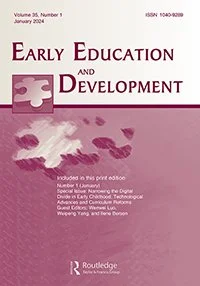Wetenschappelijk artikel over jonge risicokind
Op 7 november 2024 verscheen in Early Education and Development een artikel van Ilona Veer (UT/CBS) waaraan LEJK-lector Cathy van Tuijl als co-promotor heeft meegewerkt.
De voorspellende waarde van afzonderlijke risicofactoren voor selectieve aandacht en woordenschat werd getest bij peuters die voorschoolse educatie kregen. Uiteindelijk bleek vooral het niveau van selectieve aandacht en woordenschat op 2,5 jarige leeftijd een voorspeller te zijn van de groei die kinderen op die terreinen doormaken tot hun 5e jaar. Ook dit onderzoek wijst in feite op het belang van voorschoolse educatie met name voor kinderen die op 2,5 jarige leeftijd sterk achterlopen in hun ontwikkeling op genoemde domeinen.
Het is een open access artikel: https://www.tandfonline.com/doi/epdf/10.1080/10409289.2024.2423385?needAccess=true
ABSTRACT
Research Findings: The impact of low SES, parental depression, low social support for parenting, and growing up in a non-Western family on selective attention and vocabulary at age 2.5 and their development from age 2.5 to age 5 were examined. N = 305 children in the Netherlands were tested on selective attention and receptive vocabulary, during four measurement occasions: around the ages of 2.5, 3, 4 and 5. Multiple imputation was used to handle missing data. Relationships were investigated through multilevel latent growth curve analyses. The results showed that none of the risk factors were significant negative predictors of the baseline score or growth inattention or vocabulary. However, the lower children scored on a selective attention or vocabulary task at age 2.5, the higher their growth on this ability over the next two and a half years. Practice or Policy: Selective attention and vocabulary ability at age 2.5 are better predictors of the expected development of these skills than individual risk factors associated with poverty. This study provides tentative, preliminary evidence that early childhood selective attention and vocabulary testing may inform selection for preschool intervention programs. Follow-up research is recommended to confirm the results in the current study.

